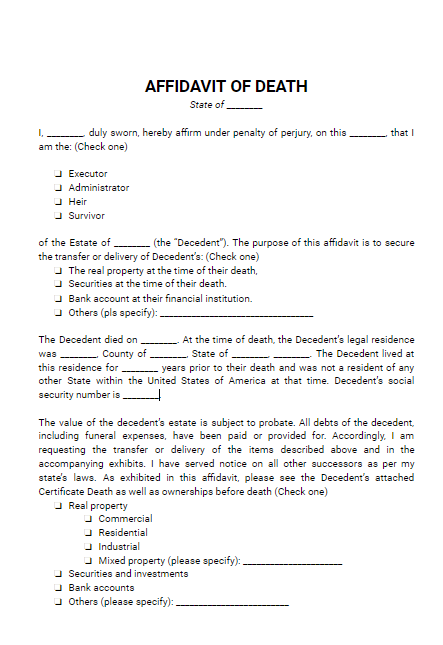- Eviction Notice Forms
- Power of Attorney Forms Forms
- Bill of Sale (Purchase Agreement) Forms
- Lease Agreement Forms
- Rental Application Forms
- Living Will Forms Forms
- Recommendation Letters Forms
- Resignation Letters Forms
- Release of Liability Agreement Forms
- Promissory Note Forms
- LLC Operating Agreement Forms
- Deed of Sale Forms
- Consent Form Forms
- Support Affidavit Forms
- Paternity Affidavit Forms
- Marital Affidavit Forms
- Financial Affidavit Forms
- Residential Affidavit Forms
- Affidavit of Identity Forms
- Affidavit of Title Forms
- Employment Affidavit Forms
- Affidavit of Loss Forms
- Gift Affidavit Forms
- Small Estate Affidavit Forms
- Service Affidavit Forms
- Heirship Affidavit Forms
- Survivorship Affidavit Forms
- Desistance Affidavit Forms
- Discrepancy Affidavit Forms
- Guardianship Affidavit Forms
- Undertaking Affidavit Forms
- General Affidavit Forms
- Affidavit of Death Forms
Affidavit of Death
When someone passes due to natural causes or an unexpected turn of events, they often leave behind real and/or personal property that the bereaved spouse, family members, or trustee would need to handle with the appropriate institutions and agencies. But due to security reasons, transferring a title, closing an account, or claiming ownership of a particular asset can be a difficult ordeal. In such cases, an Affidavit of Death can come in handy. Read More

By Type
What Is an Affidavit of Death?
An Affidavit of Death is a legal document used to declare and affirm the death of a particular individual. While the affidavit does not replace a death certificate, it can be used in conjunction with the latter for various purposes, such as the removal of the deceased tenant’s name from a joint property title, the disbursement of a trust fund to the beneficiary, and the collection of life insurance proceeds by the surviving spouse or children of the deceased. Banks, insurance agencies, courts, and other businesses often require clients to present an Affidavit of Death for formal notification before processing or issuing certain documentation.
How to Create an Affidavit of Death
Making an affidavit of death is probably the last thing you would ever want to find yourself doing. But unfortunate circumstances can put you in a place where you don’t want to be, and sometimes those circumstances involve the creation of a death affidavit. Fortunately, drafting an affidavit isn’t as difficult as it seems. Follow the guidelines below to see how you can create an affidavit of death without hiring a lawyer.
Identify the parties involved
Only someone with first-hand knowledge of the decedent’s passing should be responsible for writing and signing the affidavit. State laws dictate who has the authority to file these affidavits, which is typically the individual’s surviving family members. As the affiant, your full legal name and residential address will be necessary. Other details such as your age and social security number may also be useful for proper identification.
Provide details about the decedent
Identify the decedent, or the person who has died, in the affidavit by providing their full legal name, birth date, and death date. It isn’t necessary to go further into detail about the person’s passing, as this information is already available in the attached documentation (such as the decedent’s death certificate). You may also include additional information depending on the purpose of the affidavit.
Include a sworn statement
Under penalty of perjury, you must swear that the contents of the affidavit are true and correct to the best of your knowledge. Affirmations are usually short and simple, so make sure you conclude your affidavit by going straight to the point.
Sign and notarize the document
Lastly, sign the affidavit in the presence of a notary public. If the state you are in permits disinterested witnesses to acknowledge the affidavit without having it notarized, you can do that instead. Verification from a witness and/or notary public is necessary for all affidavits to confirm the accuracy of the claims made in the document.
FAQs
Why would I need a death affidavit?
Losing a loved one is difficult for everyone. On top of grieving and finalizing any preparations for the memorial, there are legal affairs and estate matters that you also have to take care of. But you can’t walk into a bank to close another person’s account without legal proof of that person’s passing. Thus, the affidavit does this for you by legally proving that the account holder has died and aiding in the transfer and distribution of the deceased’s property.
What are the consequences of not having an affidavit of death?
Most businesses, agencies, and courts require proof of a person’s death before granting another person access to the deceased’s personal files and accounts. Otherwise, you will not be able to act on their behalf. While the extra time and effort of securing the affidavit might seem a bit inconvenient, it’s one way for private and government institutions to protect a person’s assets and reduce the likelihood of fraud.
What happens if a person lies in an affidavit?
If an estranged spouse or parent tries to collect a certain property without your knowledge and consent, making false claims in an affidavit will only lead to bigger problems. The criminal and civil consequences for such actions may vary according to state laws, but it’s safe to say that the legal issues that arise from committing an act of perjury is enough reason to tell the truth and adhere to the lawful process of things.
Do I need a death certificate to accompany the affidavit?
An affidavit has its limitations, which is why supplemental documents are necessary for further proof of a fact. Majority of the time you’ll need a death certificate to accompany the affidavit of death when processing papers at a private or government agency. While some states don’t limit the access to these records from the public, others only allow blood relatives or spouses of the deceased to obtain the certificate from the Department of Vital Records. Legal guardians, caregivers, or beneficiaries may also acquire the certificate, provided that a court order or power of attorney is in place.
Does an affidavit expire?
Affidavits generally do not have an expiry date. However, it is possible for an affidavit to have conditions that will lead to its termination. Note that an affidavit is only valid for as long as the claims made in the document remain true and correct. If there is any evidence that challenges the information included in the affidavit, it may no longer be accepted in court.
When it comes to handling administrative tasks following the passing of a loved one, an affidavit of death allows you to notify businesses and agencies of this matter in order to address property and estate concerns without much problem. The affidavit lets you take care of certain tasks on behalf of the deceased by formally swearing under oath about their passing. Should you find yourself in a dispute, don’t hesitate to talk to a lawyer regarding your situation. Seeking legal advice ensures that the appropriate measures are followed accordingly.
